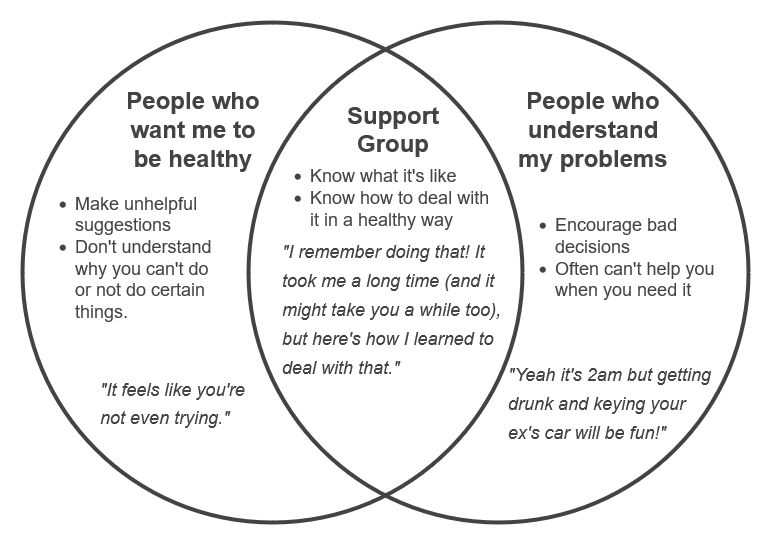Support Groups

Often free, sometimes paid, almost always cheaper than individual therapy. It seems like it would be depressing or embarrassing and while it depends on the group, 99% of support groups I've been to were the realest people I've had the pleasure of encountering. Anyway, I'm putting the free shit up front.
Alcoholics Anonymous (AA) & Spinoffs
(Including Narcotics Anonymous / NA, Alanon, and others)
Pros:
basically ubiquitous / everywhere. If you want somewhere almost anywhere day or night to just go and sit and have people who kinda sorta understand whatever hard time you're having at least a little bit, they're there, and you probably just have to google meetings in your area. There's also a million spinoffs for every possible bad habit from gambling to codependence. For discretion, AA meetings are often listed on public notice boards as "Friends of Bill" meetings in reference to the founder.
Cons:
kinda preachy, and I mean literally. While individual groups vary wildly, AA is at it's core founded in Christian philosophy. If you vibe with that, good, but if you've got real bad religious trauma you might wanna look at one of these other options. Also, if your problem is narcotics specifically, try to avoid the NA meetings the dealers go to to scope out buyers.
National Alliance on Mental Illness (NAMI)
Pros:
Very open and generalized, "Come as you are." It's for everybody, people with any kind of mental illness as well as their friends, family, and other supporters.
Cons:
Not as widely available as AA.
Self-Management and Recovery Training (SMART)
Pros:
A modern-therapy approach to substance abuse groups, using mostly behavioral therapy concepts. Very similar to DBT but better designed for a group-only format (DBT is designed to be done as both group and individual).
Cons:
Can be hard to find meetings, and they're not always free.
Wellness Recovery Action Planning (WRAP)
Pros:
Really helpful for people with long-term mental illness. It helps you think deeply about your symptoms, what worsens or improves them, and what you need to do to plan for them.
Cons:
groups are almost always part of a larger paid program (at like a rehab or crisis stabilization facility) or otherwise paid (but I've gotchu on the free shit don't worry! Wellness Recovery Action Planning).
Dialectal Behavior Therapy (DBT) Skills Groups
Pros:
excellent therapy with a huge amount of very positive evidence even in some of the most difficult to treat disorders. Skills that blend a combination of modern psychology, medicine, traditional spiritual practices, and ways to conserve and target energy to combat injustice.
Cons:
almost always costs money, and the full tested strength involves an integrated group, individual, and phone-coaching approach that many programs don't fully implement.